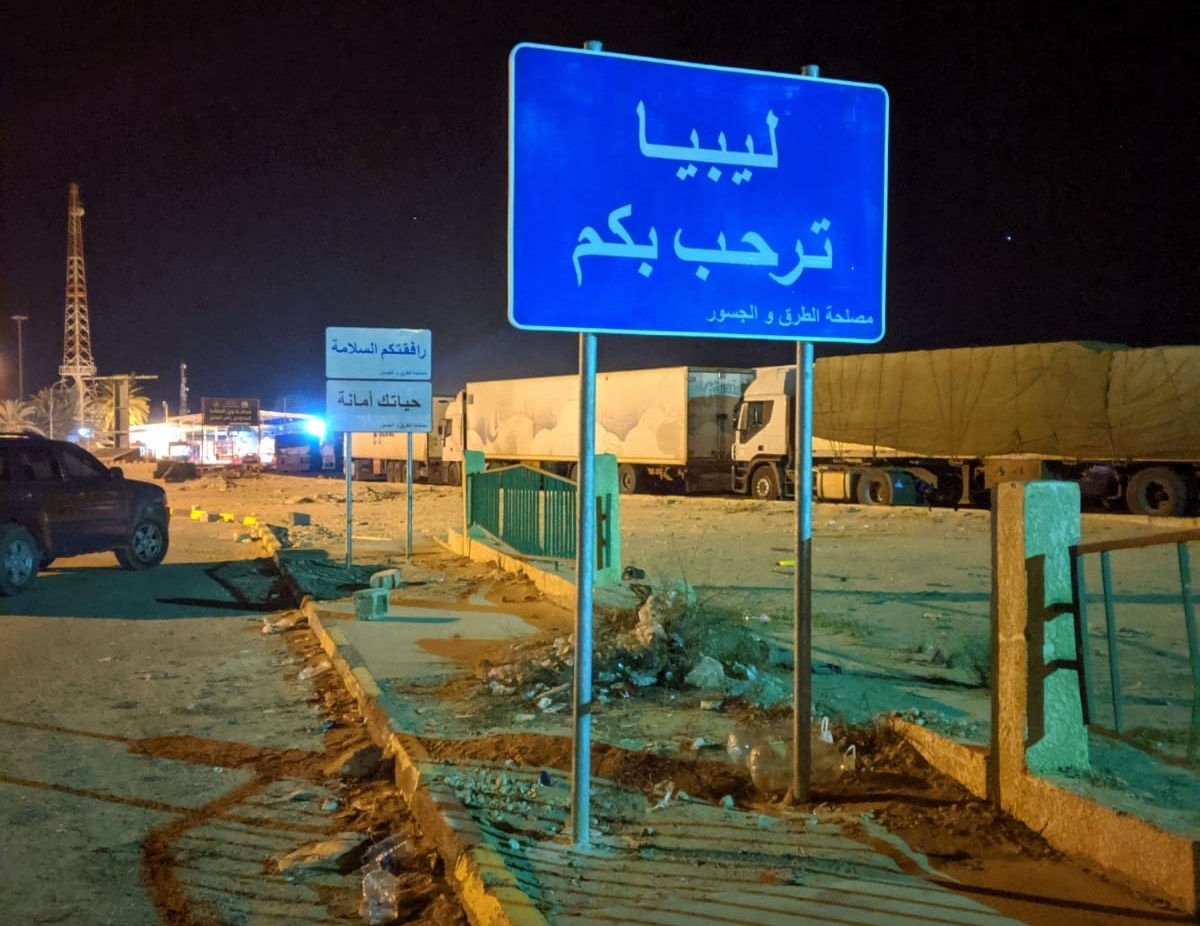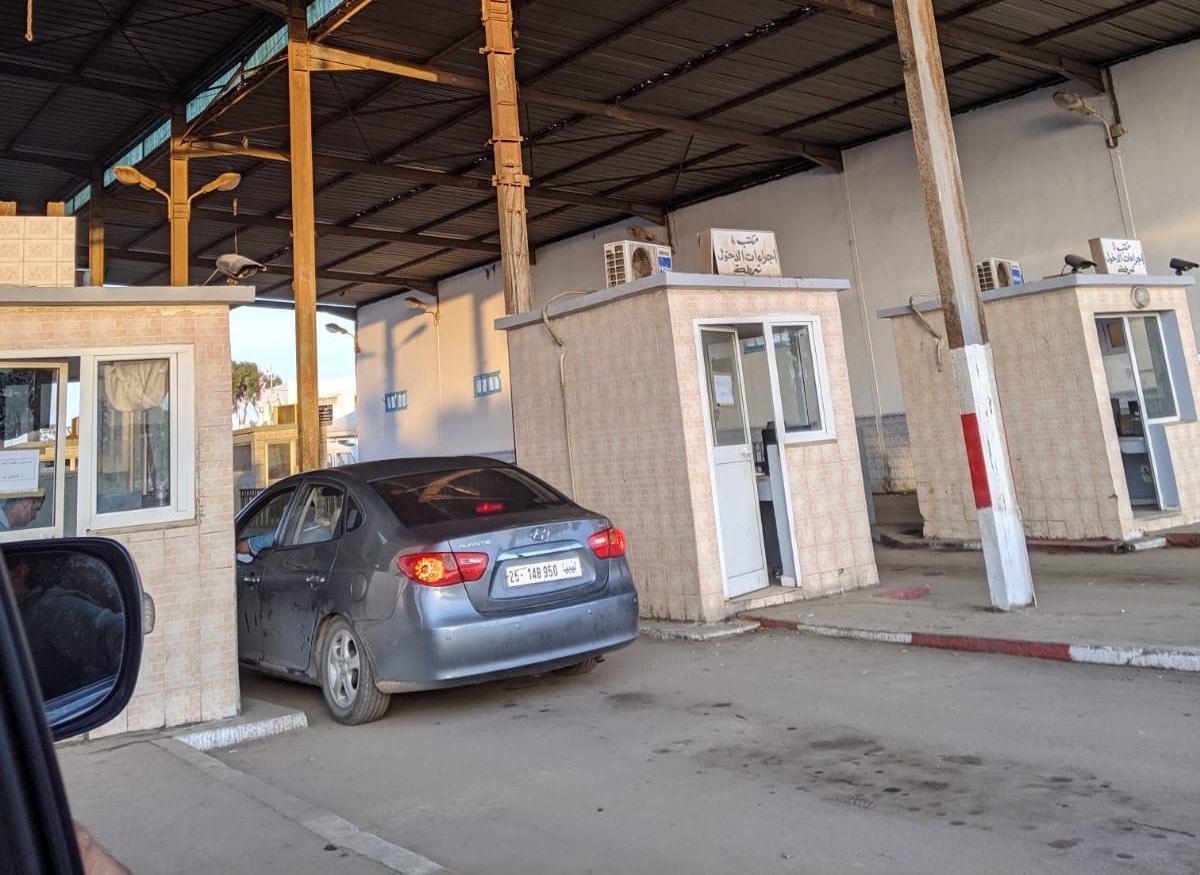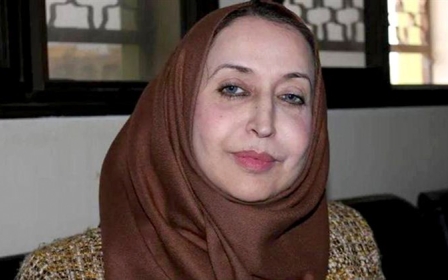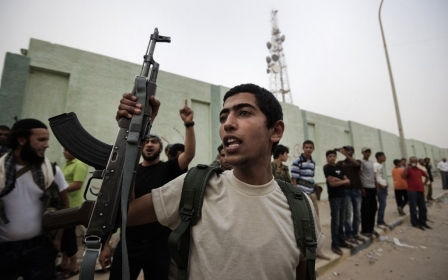Libya-Tunisia border reopens after weeks of negotiations over treatment of Libyans

The critical Libya-Tunisia border crossing of Ras Ajdir reopened on Thursday, after two weeks of closure by the Libyan interior ministry following a series of complaints from Libyan travellers about their treatment by Tunisian officials.
This closure is the latest in a number of shutdowns of the border since the 2011 uprisings.
Hafed Moamar, Libyan spokesman for Ras Ajdir passport control office, told Middle East Eye that they were increasingly receiving complaints from Libyans about waiting times and poor treatment, which led to an interior ministry investigation into claims.
“Libyans are made to wait seven, 15, 20 hours or more at times. When the committee went to check, they found that cars would get through Libyan checkpoints quickly, but then the hold up is the wait to get through the Tunisian side,” Moamar said.
Crossing out of Libya, there are a number of aisles for cars and a window with a border agent for each aisle. Once travellers have their passports checked and stamped they pass into more aisles - a queuing area - before reaching the Tunisian crossing.
New MEE newsletter: Jerusalem Dispatch
Sign up to get the latest insights and analysis on Israel-Palestine, alongside Turkey Unpacked and other MEE newsletters
According to Moamar, it was in this section that they found to be causing a buildup of cars and severe delays to waiting times, stating that a task that should be quick and simple - checking and stamping passports - was deliberately being slowed down and made tedious for travellers.
Effect on citizens
Ras Ajdir is the main border crossing for Libya. The Libyan coastal highway - the only major road that runs the entire east-west length of the country - passes through the major trade and shopping collectives in all of Libya’s main coastal cities, and straight to Ras Ajdir.
“Unlike other borders, Ras Ajdir has direct access to the Libyan coastal highway,” Moamar told MEE. “It is the main border for the state, and is very important for trade,” he added.
Whilst there are other land crossings between the two countries, Ras Ajdir is the most accessible and largest. Considering that Tripoli’s Mitiga airport - the capital’s only functioning airport - has been intermittently closed for months, Ras Ajdir was the only way out of the country for many residents in western Libya.
Many people travel outside Libya for medical care due to limited resources in the country, and for many Libyans living abroad, Ras Ajdir is an important route to visit family.
Fariha Naji, a resident of Zuwarah, a city 60km from Ras Ajdir, told MEE that the treatment at the Tunisian border has become intolerable.
“They have one aisle open and they sometimes leave their posts and stand chatting on the side. They look at us funny and make us wait for hours,” she said. “They didn’t use to treat us like this,” she said, adding that she hopes things can return to the way they used to be.
Moamar told MEE that whilst the closure was for the sake of Libyan citizens, to ensure that they could travel “comfortably and with dignity”, the effects on them were great.
“I get messages from people telling me they will miss their chemotherapy sessions,” Moamar said. “I don’t know how to reply to them, but these issues need to be resolved so in the long run, it’s easier for people like that to get to their appointments and back without being hassled at the border.”
According to Moamar, who has been attending meetings between Libyan and Tunisian officials on the subject, both sides have finally agreed on some points, which were checked by Libyan interior ministry officials before the border was able to reopen on Thursday.
Ordinarily, the Tunisian side of the border only has one aisle open for Libyan cars entering Tunisia. This means that all traffic is funnelled into one long queue and trickled slowly through the gates into the single queue for passport control.
In addition, all cars are required to be registered on the driver’s passport before cars are allowed to pass into Tunisia. Only one kiosk is available to register vehicles, further complicating the process.
According to Jumaa Ghreeba, the director of the passports and nationality department of the Libyan Interior Ministry, Tunisian officials agreed to open five aisles and passport control windows for citizens to pass through, as well as three kiosks for car registration.
He added that other issues raised had not been fully resolved, but that both sides will be working together in the spirit of keeping the crossing working effectively.
One issue that remains to be discussed further is the issues of "similar names". According to Moamar, Tunisian authorities have a list of individuals wanted in relation to crimes, and if they come across individuals with very similar names, they hold them for hours until they can check for relations.
Often, individuals held because of this have nothing to do with the wanted individual and are made to wait to be cleared for merely having a similar full name.
“Discussions will continue, but we need to ensure that all individuals’ rights are protected at Ras Ajdir. Tunisians and Libyans alike must be treated with respect,” Moamar said.
Informal economy
The lucrative border crossing and the surrounding area has seen repeated clashes over the course of the ongoing war in Libya, as various factions have attempted to take control of it.
From pasta to fuel, the border is used daily by traders - and smugglers - as neighbouring towns, particularly on the Tunisian side, rely heavily on cross-border trading.
Tunisia's informal economy has steadily expanded in recent years as formal employment opportunities for the country's growing young population have dwindled.
'We now have an interior minister who is motivated to make changes, and it’s about time'
- Hafed Moamar, passport control
The informal economy produces more than a third of Tunisia's GDP and is the primary employer of young Tunisians, providing jobs to around 60 percent of working men and 83 percent of working women under the age of 40.
Informal jobs are disproportionately prominent in the southern and interior regions and take a wide variety of forms – including people selling goods on the side of roads or in weekly markets and smuggling items across the borders with Libya and Algeria.
In the Tunisian border town of Ben Guerdane, over 90 percent of the 60,000 inhabitants consider the crossing an important financial resource. According to a 2017 World Bank report, the economies of Tunisia’s border towns all revolve around “illicit” bilateral trade at the Ras Ajdir border.
Numerous attempts to prevent the smuggling of subsidised goods, including food items and fuel, from Libya into Tunisia have been made in recent years. However, those involved in trading these goods on both sides of the border have vehemently opposed restrictions.
Last year, the crossing was closed for over ten days after Tunisian smugglers closed the roads leading from Ras Ajdir into Tunisia. The smugglers were attacking Libyan number plate cars with bricks and blocking roads with trucks in protest against restrictions put in place by Libyan authorities to counter smuggling.
“The Tunisians think they have a right to these products,” Moamar said. “Whenever the Libyan government takes a decision aimed at tackling smuggling, the Tunisians block the roads and organise protests.”
The increase in organised fuel smuggling in the oil-rich country has led to an extended fuel crisis, with many petrol station owners selling their allocated subsidised fuel to smugglers working on the black market.
The pump price of petrol in Libya before the 2011 revolution was between 0.200 and 0.220 Libyan dinar per litre ($0.15-$0.16) due to government subsidies - according to the Libyan Audit Bureau, Libya spent $30bn on fuel subsidies in the five years prior to 2017. However, since 2011, and as fuel smuggling has proliferated, the price at the pump has almost doubled.
But that’s not the main problem. Residents would be happy to pay this much for fuel, but petrol has not been readily available in petrol stations for years.
Measures have been put in place to reduce the over-the-border smuggling of fuel and any individuals found attempting to transfer fuel are fined and the fuel is confiscated.
However, smugglers have found ways to circumvent authorities. People replace petrol tanks in their cars with expanded tanks which will take more fuel, and allow them to take more over the border without detection.
Once over the border, smugglers use rubber tubes to suck the fuel out of the tank and into a container to sell on the roadside. Contraband fuel traded at the border accounted for 17 percent of Tunisian consumption in 2014.
Although some core issues including smuggling are not resolved, neither side can afford for the border to be closed any longer. The border will be reviewed by Libyan officials in two weeks, according to Moamar, to make sure that all agreements are upheld.
“We now have an interior minister who is motivated to make changes, and it’s about time,” Moamar said.
This article is available in French on Middle East Eye French edition.
Middle East Eye delivers independent and unrivalled coverage and analysis of the Middle East, North Africa and beyond. To learn more about republishing this content and the associated fees, please fill out this form. More about MEE can be found here.





